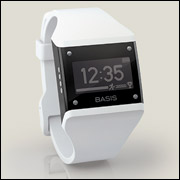
The Basis wearable fitness monitor — announced back in January at the 2012 International CES — has finally shipped, the company said Thursday. Already sold out for the holidays, according to the website, the Basis can be reserved for US$199.

The device enters a market with notable competition from Jawbone, LarkLife and Nike. Each of these devices has likely evoked the lyrics “every step you take” by The Police — they track those steps and keep a watchful eye on a plethora of other activities.
Many of them have just as often ended up in drawers when the users gave up wanting to be monitored. The makers of the Basis believe this time it could be different.
“Consumers were left wondering what to do with all that data after the novelty period wears off,” said Basis CEO Jef Holove. “There is often the ‘now what’ reaction from users.”
Now What?
The Basis system uses multiple sensors on the wearable band that can detect when a user is sleeping or exercising, and data is sent via Bluetooth 2.1 to the cloud. The answer to “now what” from the Basis standpoint is not only to track the user’s activity but also to provide the data in a way that can be useful.
Users can monitor their data, as with other devices, but Basis takes tracking a step further by offering encouragement — and more importantly, adapting to trends in the user’s life.
“We have an approach called ‘healthy habits,'” Holove told TechNewsWorld. “These are the small but healthy actions that you can take that add up to the healthy outcomes that fit into real life.”
Basis is designed with the understanding that most people don’t live structured and regimented lives, engaging in the same activities and routines day in and day out. While the device offers encouragement and rewards, it also offers forgiveness that encourages users to stick with the program even when they fall behind.
“We tried to build a system that tackles this issue head on,” added Holove. “Rather than have the system ignore those times when you fall off the pattern, we try to get users to recover when they fall off the wagon and get back on track. We offer a way to wash off the bad week and get a fresh start.”
Life Tracking
The Basis is part of a growing trend of 24/7 wearable trackers.
“There are also many apps for tracking personal health and fitness statistics and applying that data towards general and specific goals,” said Billy Pidgeon, senior analyst at Inside Network.
Unlike a heart rate monitor or cycling computer, which track activity only when users are exercising, the concept with these new devices and apps is to track one’s whole life.

The result is that this isn’t just for the serious athlete, but for anyone who is looking to lead a little more healthy lifestyle.
“Certainly we see that some fitness enthusiasts will adapt to this,” Holove noted, “but our approach is more about collecting patterns across the whole day or the whole week as opposed to tracking second-by-second heart rate during a run.”
There could be a potentially vast market as more consumers realize the benefits these technologies can provide.
“Companies like Basis … are aiming for the consumer that has found other forms of exercise too rigid and/or boring. The ones that really are taking the ‘just enough’ approach,” said Julie Sylvester, coproducer of Living in Digital Times.
The market for wearable fitness devices is expected to reach 90 million shipments in 2017, according to data from ABI Research.
“That is up about 40 percent from the predictions that we were seeing two years ago,” Sylvester told TechNewsWorld. “People love gadgets — and routine workouts can be boring.”
Band on the Run
The question is whether all these players, including Basis, can stand out, or whether there will be saturation in the market that could cause only the best to go the distance. To get there might require devices that are more specialized than generalized.
“Everyone wants a piece of this market,” said Roger L. Kay, principal analyst at Endpoint Technologies Associates.
“The simple exercise monitor market is pretty saturated, but the medical monitoring market is bound to be hot,” he told TechNewsWorld. “But that market is a lot less about the device and a lot more about the ecosystem. Consumers will adopt when the entire back end is hooked up.”
Does that mean Basis might not have a basis for survival? Given the competition, it is going to be quite a race to the finish line.
“At $199, Basis is not likely to go mass market,” Pidgeon told TechNewsWorld.
“I could see the product and related services selling with the right marketing — and perhaps by partnering with popular sports and fitness gear brands,” he said. “There’s more volume opportunity for fitness services based on inexpensive sensors built into or connected to other devices, like footwear or a phone.”





















































